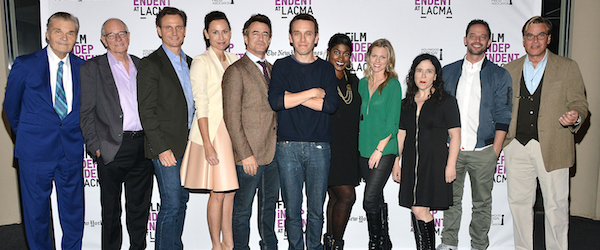Live Read fans learned days before the event that fashion designer Scott Sternberg would be guest directing the latest installment of the series. If that news wasn’t exciting enough, the fact that the Band of Outsiders founder was bringing to the stage one of cinema’s greatest screenplays–Paddy Chayefsky’s Network–was sure to whet their appetites. But one major question remained: who would be playing the iconic role of Howard Beale? One by one, cast was announced… Minnie Driver as Diana Christenson originally played by Faye Dunaway Tony Goldwyn as Max Schumacher originally played by William Holden Dermot Mulroney as Frank Hackett originally played by Robert Duvall Fred Willard as Arthur Jensen originally played by Ned Beatty Nick Kroll as Nelson Chaney originally played by Wesley Addy Alex Borstein as Louise Schumacher originally played by Beatrice Straight Lauryn Whitney as Laureen Hobbs originally played by Marlene Warfield Chelsey Crisp as Walter C. Amundsen originally played by Jerome Dempsey Warren Olney as Narrator originally voiced by Lee Richardson And in the role of beleaguered anchorman Howard Beale originally played by Peter Finch… AARON SORKIN!!! The TV legend and Academy-award winning screenwriter took center stage as the crazed newscaster, a casting choice all too appropriate, given Sorkin’s vocal admiration for Chayefsky (he mentioned him in his Oscar speech) and prominence in the television world. The experience proved rather meta for Sorkin, as he could barely contain himself during the scene where the programming branch sifts through a series of scripts starring “crusty-but-benign” older, male characters. The audience couldn’t contain themselves either. Nick Kroll as Great Ahmed Yes, Nick Kroll played Nelson Chaney and did so admirably. But it was his side performance as the radical leader Great Ahmed Kahn that brought down the house. Ahmed, a hulking, imposing figure, was in no way a physical match for Kroll, but nevertheless the Kroll Show creator delivered a sly, frightening reading to great comedic effect. Hectic Workplace Network is known for having multiple characters yelling over each other, with cross-conversations and utterly confusing office hysteria. The stage came alive in similar shouting matches, as cast members griped, cursed and spat at high velocity, doing justice to the great ensemble performances Sidney Lumet orchestrated in the original film. Kudos to Sternberg and the entire cast for pulling it off. Borstein Brings the Heartbreak The darkly comedic Network offers few characters worthy of pity. One exception is Louise Schumacher, whom Max cheats on and leaves for the young, cold-hearted Diana. Devastated, Borstein brought the reading to a halt, forcing the protagonist to face the real human consequences of his actions. The audience grew quiet as she laid out her agonizing heartbreak. “Mad as Hell” Audience Network is all about TV’s effect on the masses, so it was only appropriate that the audience was enlisted to chant along with Sorkin’s Beale during the legendary scene where he stands up on live TV and demands we yell in unison, “I’m mad as hell and I’m not going to take it anymore!” The words appeared bold onscreen, and the audience joined Sorkin, now red with Beale’s righteous anger, in proclaiming that this world owes us one and we won’t stay quiet (especially when it brings good ratings). The Chilling Relevance Sorkin’s laughter at the programming scene was just one small indicator of how prophetic Network has turned out to be. From scenes predicting modern talk shows to even reality TV, Network saw what was coming. It served not so much as a warning, but rather a tired sigh at the inevitable march toward the contemporary state of news media. What we are to do about it? The film doesn’t say. But its undeniable clairvoyance makes the script all the more unsettling with each passing year. Daniel Larios / Film Independent Blogger
